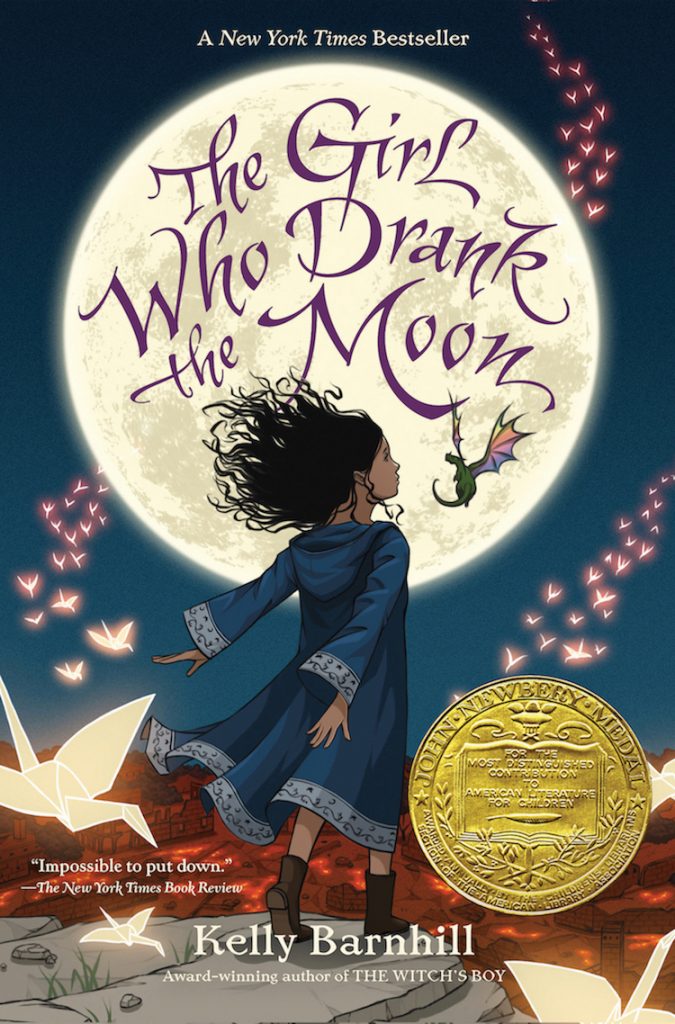By Samantha Verini, The University of Arizona
“A story can tell the truth, she knew, but a story can also lie. Stories can bend and twist and obfuscate. Controlling stories is power indeed.”

As difficult as it is to accept, we are in an era of information control and censorship. Net neutrality once again arrives on the stage of political discourse. Free speech remains a widely debated clause of our constitution. “Fake news” and sensationalized stories are a frequent point of contention. Where do we get our stories, and how are they told to us? We’re more fortunate than the characters in Kelly Barnhill’s novel The Girl Who Drank the Moon, whose stories are manipulated by an evil witch, but Barnhill’s fantasy tale does say something powerful about information control in the real world.
The Girl Who Drank the Moon approaches information from multiple points of view. As a baby, our protagonist, Luna, is (un)fortunately selected as a sacrifice for the witch who lives in the woods. She is taken from her mother and left at the edge of the forest for the witch. Fortunately, the witch in the woods, Xan, is not evil at all, and she raises Luna as her own. When Luna develops abilities Xan cannot control, Xan protects Luna and those around her and bottles Luna’s magic inside her. But, there are consequences to Xan’s actions; Luna forgets all about magic and her past.
Xan withholds much of Luna’s life from her as an act of love. She twists Luna’s stories for her own protection, in hopes that she can have a normal childhood. As Luna grows and Xan begins to wither with age, Luna realizes that she and Xan lie to each other, though lovingly. Xan tells Luna she is fine when she isn’t, and Luna hides many of the strange, inexplicable visions that come to her. There are lies we all tell to protect one another–but when does withholding that information become harmful?
Barnhill juxtaposes Xan and Luna’s relationship with a more sinister one. In the Protectorate village, just on the edge of the woods, a cloud of sorrow hangs over the townspeople. The Sisters of the Star, an elite and exclusive group of female warriors, control and contain knowledge. Their library, bursting with all the knowledge in the world, is hidden from the public. “Knowledge is a terrible power indeed,” they insist. Without knowledge or a basic understanding of the way their world works, the people in the Protectorate suffer. Those in power gladly abuse the villager’s lack of information to keep themselves in control. Their suffering becomes cyclic: they cannot object because they have no way of knowing that their lives could be improved, and their government is all too content to keep it that way.
In the midst of all the censorship in The Girl Who Drank the Moon–loving or otherwise–Barnhill stresses one vital thing: wonder. It only takes one person, one question or one individual willing to object or look just a little deeper to change the entire order. If that one person inspires others to do the same, they can begin to undo the wrong that’s been done. Even further, if they can take an empathetic look at someone’s motivation for withholding information, then they can understand how to respond.
I won’t give any spoilers, but sometimes the reason people do awful things to others is because awful things done to them. The Girl Who Drank the Moon doesn’t claim that those circumstances free a person from blame, but they do emphasize one vital, difficult point: people who do bad things are still people. This book surges with love–practically bursts with it–and it urges the idea that sharing what we understand, know and consider is the foundation of respect (which tends to be the foundation of love).
In a world of witches, swamp monsters and dragons, there’s much to learn about power and wonder. The Girl Who Drank the Moon belongs in the league of Newbery medalists: aggressively compassionate, intricately threaded and pulsing with whimsy. It is truly fantastic and fantastically true. It shares a story with ideas we can all use right now–integrity, equality and empathy. In our complex world of politics, fabrications, sensationalizations and censorship, we should remember that wonder is the greatest power of all. It is what will propel us into a brighter future. Hopefully, one with dragons.
Kelly Barnhill is the author of The Witch’s Boy, Iron Hearted Violet, The Mostly True Story of Jack and the novella The Unlicensed Magician. Her new book, Dreadful Young Ladies and Other Stories, a collection of short fiction, will release in February of 2018. She is a master fantasist for both children and adults. She is also a mother and a teacher. You can find her on twitter (which is worth a follow if you want to add a little insight and whimsy to your day) @kellybarnhill*. She also has a great blog!
Barnhill will present twice (woohoo!) at the 2018 Tucson Festival of Books. She will give a presentation that focuses on YA and Children’s literature. She will also serve on a panel that aims more towards adult literature, where she will discuss her forthcoming collection of short stories.
* Kelly Barnhill occasionally goes on Twitter hiatuses, and as of this post is on hiatus now.
Journey through Worlds of Words during our open reading hours: Monday-Friday 9 a.m. to 5 p.m. and Saturday 9 a.m. to 1 p.m. Check out our two online journals, WOW Review and WOW Stories, and keep up with WOW’s news and events.
- Themes: Girl Who Drank The Moon, Kelly Barnhill, Samantha Verini
- Descriptors: Books & Resources, Debates & Trends, WOW Currents

beautiful story !